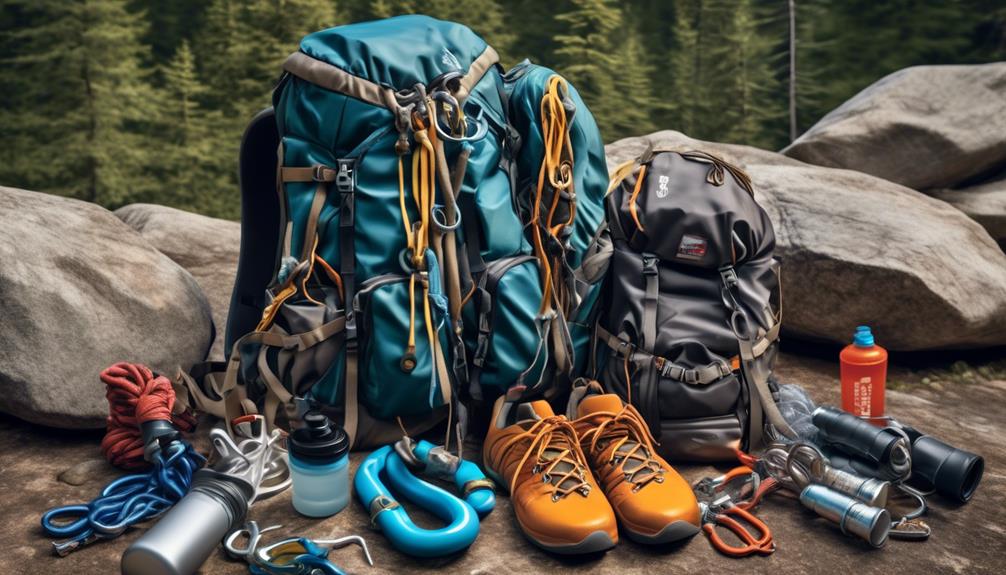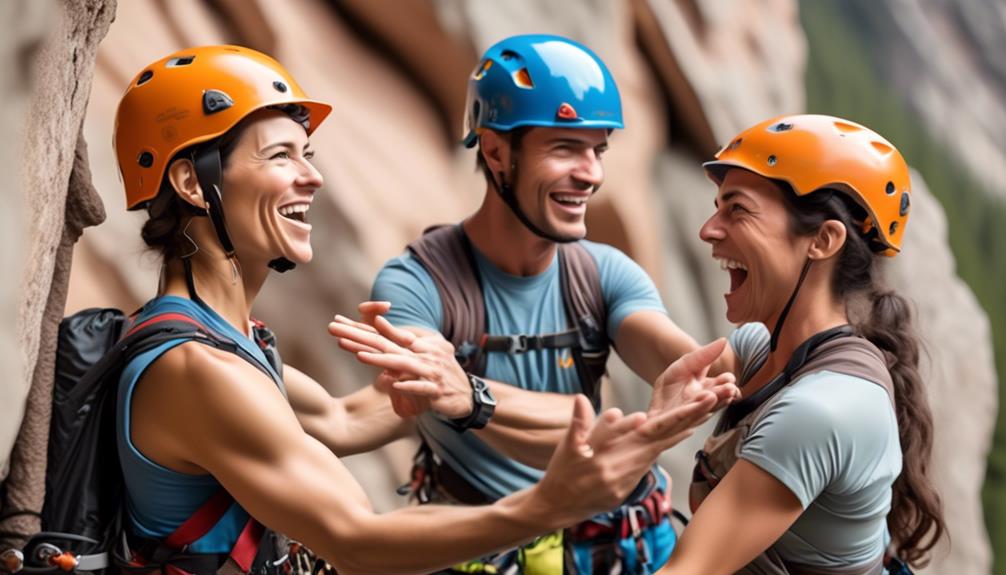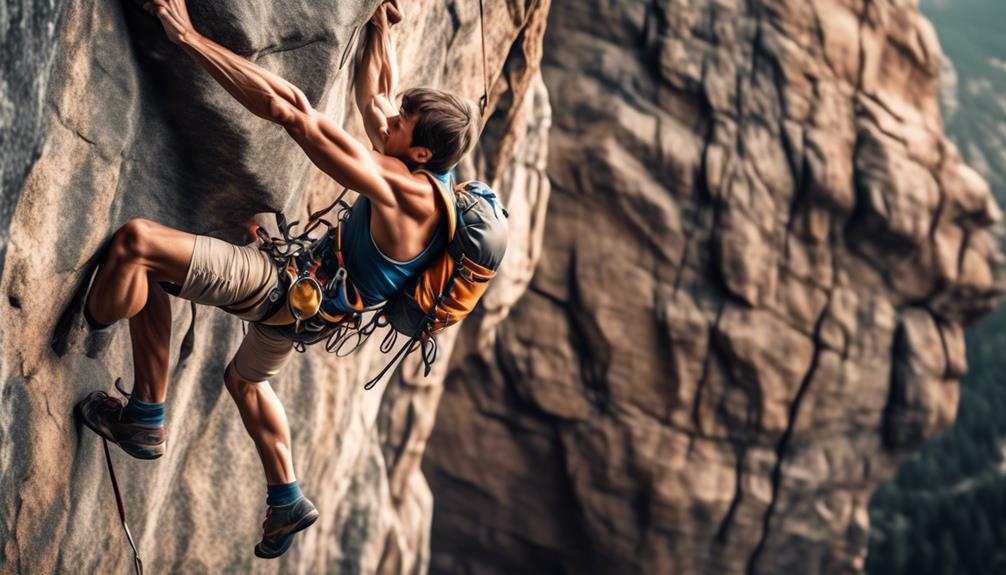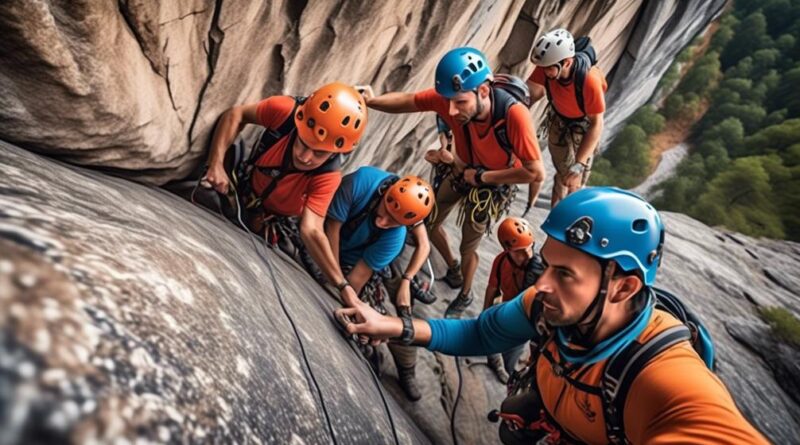14 Tips for a Professional-Instructed Rock Climbing Vacation
You may not realize that a professional-instructed rock climbing vacation can provide you with an exhilarating and challenging experience, regardless of your skill level. However, there are crucial tips to keep in mind to ensure that your adventure is both safe and enjoyable.
Whether you're a beginner or an experienced climber, these tips will help you make the most of your rock climbing vacation and ensure that you come away from it with a sense of accomplishment and fulfillment.
Choosing the Right Location
When planning your rock climbing vacation, it's crucial to carefully choose the location based on your skill level and interests. Researching destinations is essential to ensure that you find a place that offers the right mix of challenges and experiences for you. Look for destinations that cater to your skill level, whether you're a beginner, intermediate, or advanced climber. Consider factors such as the type of rock formations, difficulty of routes, and available amenities.
Once you've narrowed down your options, it's time to look into local accommodations. Check for nearby campsites, cabins, or hotels that offer convenient access to the climbing areas. Some destinations may have established campgrounds specifically designed for climbers, complete with amenities such as shower facilities, communal areas, and gear rental services. Staying close to the climbing sites not only saves you time and effort in commuting but also allows you to fully immerse yourself in the climbing experience.
Local accommodations can also provide valuable insights and connections to the climbing community in the area. You may get recommendations for the best routes, insights into current conditions, and opportunities to meet fellow climbers. Being part of the local climbing scene can enhance your overall experience and make your rock climbing vacation even more memorable.
Understanding Your Skill Level
Assess your rock climbing skills and experience level to determine the appropriate challenges and opportunities for growth during your vacation. Understanding your current abilities is crucial for a fruitful and safe rock climbing experience. Take an honest look at your proficiency in various climbing techniques, such as bouldering, top-roping, lead climbing, and multi-pitch climbing. Assessing your abilities will help you identify areas for skill development and improvement strategies.
Recognizing your limitations is equally important. Be realistic about your strengths and weaknesses as a climber. Consider factors such as endurance, strength, technical knowledge, and mental preparedness. Understanding your limitations will guide you in choosing routes and challenges that align with your current skill level while still offering opportunities for growth. It's okay to push yourself, but it's equally important to recognize when a route might be beyond your current abilities.
Once you have assessed your abilities and limitations, it's time to focus on improvement strategies. Consider what specific skills you'd like to develop or enhance. Maybe you want to work on improving your footwork, building more upper body strength, or gaining confidence in lead climbing. Communicate these goals to your climbing instructor so they can tailor the vacation experience to help you achieve them.
Packing the Essentials

To ensure a successful rock climbing vacation, pack the essentials that align with your identified skill level and improvement goals. Essential gear is crucial for a safe and enjoyable climbing experience. Create a comprehensive packing list that includes items such as a harness, rope, carabiners, climbing shoes, helmet, and chalk bag. Check the condition of your gear and ensure it meets safety standards before your trip.
Additionally, consider the weather conditions at your destination and pack appropriate clothing choices. Layering is key, so pack moisture-wicking base layers, insulating mid-layers, and a waterproof outer shell. Don't forget gloves, a hat, and sunglasses to protect yourself from the sun and wind.
When considering your climbing skill level and goals, your packing list may include specific items such as ascenders, descenders, or specialized protection gear. If you're focusing on improving your lead climbing skills, pack quickdraws, a lead rope, and belay device. On the other hand, if you're more interested in bouldering, ensure you have a crash pad, chalk, and suitable climbing shoes. Tailoring your gear to your skill level and objectives will enhance your learning experience.
Lastly, consider the terrain and duration of your climbing vacation. Multi-day trips may require camping equipment, while alpine climbs may necessitate additional safety gear such as crampons and an ice axe. By packing thoughtfully and purposefully, you'll be well-prepared for a productive and enjoyable rock climbing vacation.
Learning About Safety Measures
Ensure your climbing safety by familiarizing yourself with essential safety measures and protocols. Before embarking on your rock climbing vacation, it's crucial to understand the safety equipment required for the activity. Harnesses, ropes, carabiners, and helmets are some of the fundamental pieces of safety gear. Make sure you're familiar with how to properly inspect and utilize this equipment.
Additionally, understanding emergency procedures is paramount. Familiarize yourself with the communication signals and emergency protocols that will be used during the climb. Knowing how to communicate distress or an emergency situation is vital for your safety and the safety of others.
When it comes to safety equipment, always double-check that your harness is properly fastened and that your ropes and carabiners are securely in place. Inspect your helmet for any damage and ensure it fits snugly. Moreover, understanding how to perform basic safety checks before and during the climb can prevent accidents. Learning how to tie essential knots and being aware of proper belaying techniques are also critical for your safety.
In the event of an emergency, knowing the correct procedures can make a significant difference. Be sure to understand how to signal for help and what to do in case of a fall or injury. Familiarize yourself with the emergency protocols established by your climbing instructor or guide.
Communicating With Your Instructor

When communicating with your instructor, make sure to express any concerns or questions you may have regarding the climbing experience. Effective communication is crucial for a successful rock climbing vacation. Building rapport with your instructor is essential for a safe and enjoyable experience.
Here are some tips for communicating effectively with your instructor:
- Ask Questions: Don't hesitate to ask your instructor about anything you're unsure of. Whether it's about the equipment, safety measures, or the climbing route, seeking clarification will help you feel more confident and prepared.
- Express Concerns: If you have any fears or apprehensions about the climbing experience, it's important to communicate these to your instructor. They can provide reassurance, offer alternative options, or adjust the plan to accommodate your needs.
- Share Expectations: Let your instructor know what you hope to achieve during the vacation. Whether it's mastering a specific climbing technique, conquering a challenging route, or simply enjoying the experience, communicating your goals will help them tailor the instruction to meet your expectations.
- Provide Feedback: After each climbing session, share your thoughts with your instructor. Whether it's about the pace of the instruction, the difficulty level of the climbs, or any other aspects of the experience, constructive feedback can help enhance your overall vacation.
Setting Realistic Goals
Consider your current skill level and physical abilities when setting realistic goals for your rock climbing vacation. Assessing abilities accurately is crucial for a safe and enjoyable experience. Start by evaluating your climbing experience, strength, and endurance. Setting goals that align with your abilities will help you avoid frustration and potential injury.
When goal setting, it's essential to be honest with yourself. Set achievable targets based on your current climbing proficiency. For instance, if you're relatively new to climbing, aiming to conquer advanced routes right away might be unrealistic. Instead, focus on improving technique, building endurance, and gradually progressing to more challenging climbs. By setting smaller, attainable goals, you can track your progress and celebrate achievements along the way.
Remember that physical fitness plays a significant role in achieving climbing goals. Assess your overall strength, flexibility, and cardiovascular endurance. Tailor your goals to areas where you can realistically improve before your vacation. This might involve specific training regimens or focusing on areas of weakness.
Furthermore, consider the environmental factors of your upcoming climbing destination. Research the type of rock formations, climate, and altitude, and factor these into your goal setting. For instance, if you're used to indoor climbing but plan to tackle outdoor routes, adjust your goals accordingly.
Embracing the Challenge

Embrace the challenge of rock climbing by approaching each route with a positive mindset and determination to push your limits. Rock climbing is as much a mental challenge as it's physical, and overcoming fears and mental barriers is key to success. Here's how to mentally prepare for the challenges of rock climbing:
- Visualize Success: Before tackling a route, take a moment to visualize yourself successfully reaching the top. Imagine the movements, the holds, and the feeling of accomplishment. This mental rehearsal can help build confidence and reduce anxiety.
- Focus on Breathing: When faced with a difficult section of a climb, focus on your breathing. Deep, rhythmic breathing can help calm your mind and maintain focus, allowing you to tackle the challenge with a clear head.
- Positive Self-Talk: Replace negative thoughts with positive affirmations. Remind yourself of past accomplishments and affirm your ability to overcome the current challenge. Encouraging self-talk can boost confidence and motivation.
- Learn from Setbacks: Embracing the challenge means accepting that setbacks are a natural part of the process. Instead of dwelling on failures, view them as learning opportunities. Analyze what went wrong, make adjustments, and approach the challenge with renewed determination.
Reflecting on the Experience
After embracing the mental challenges of rock climbing, it's important to take a moment to reflect on the experience and gather valuable insights for future climbs. Reflecting on your rock climbing vacation can provide a profound sense of personal growth. You may have surprised yourself with your physical and mental capabilities, gaining a newfound confidence in your abilities. Overcoming fears is an integral part of rock climbing, and reflecting on how you conquered those fears can be empowering. It's a reminder that you have the strength to push through difficult situations, not just in climbing but in other areas of your life as well.
Taking the time to reflect on your rock climbing vacation also allows you to identify areas for improvement. Maybe you struggled with a particular technique or found it challenging to trust your equipment. These insights can guide your future training and help you become a more skilled climber.
Reflecting on your experience can also deepen your appreciation for the sport. It's an opportunity to relive the exhilarating moments and the breathtaking views, fostering a sense of gratitude for the opportunity to engage in such an adventurous activity.
Frequently Asked Questions
Can I Bring My Own Climbing Gear or Do I Have to Rent It?
You can bring your own climbing gear if you prefer. However, rental options are available if needed. It's always good to double-check with the tour operator beforehand. They can also accommodate personal dietary preferences for meals during your climbing vacation.
Are There Any Specific Dietary Restrictions or Meal Options Available During the Trip?
You can inform us of any dietary restrictions, and we'll accommodate your needs. Our menu options cater to various preferences. As for climbing gear, you can bring your personal equipment, or we can provide it for you.
What Is the Instructor-To-Participant Ratio for the Rock Climbing Vacation?
The instructor-to-participant ratio for the rock climbing vacation ensures personalized attention. Qualified instructors prioritize safety, tailor experiences to participant skill levels, and teach essential climbing techniques. You'll benefit from expert guidance and individualized support throughout the adventure.
Are There Any Additional Activities or Excursions Included in the Vacation Package?
Included in the vacation package are various adventure options and off-site activities. Group excursions and excursion options are available for a well-rounded experience. You'll have the chance to explore and enjoy additional activities beyond rock climbing.
Can I Request a Specific Type of Rock Climbing Experience (E.G. Traditional, Sport, Bouldering) or Is It Predetermined by the Instructor?
You can request a specific rock climbing style, and instructors are often flexible in accommodating participant preferences. Many professional-instructed rock climbing vacations offer customized experiences, allowing you to tailor your adventure to your preferred climbing style.
Conclusion
Overall, a professional-instructed rock climbing vacation can be an exciting and rewarding experience. By choosing the right location, understanding your skill level, and packing the essentials, you can set yourself up for success.
Communicating with your instructor, setting realistic goals, and embracing the challenge will also help you make the most of your experience.
Reflecting on the experience afterwards will allow you to appreciate how far you've come and inspire you for future adventures.
Happy climbing!
